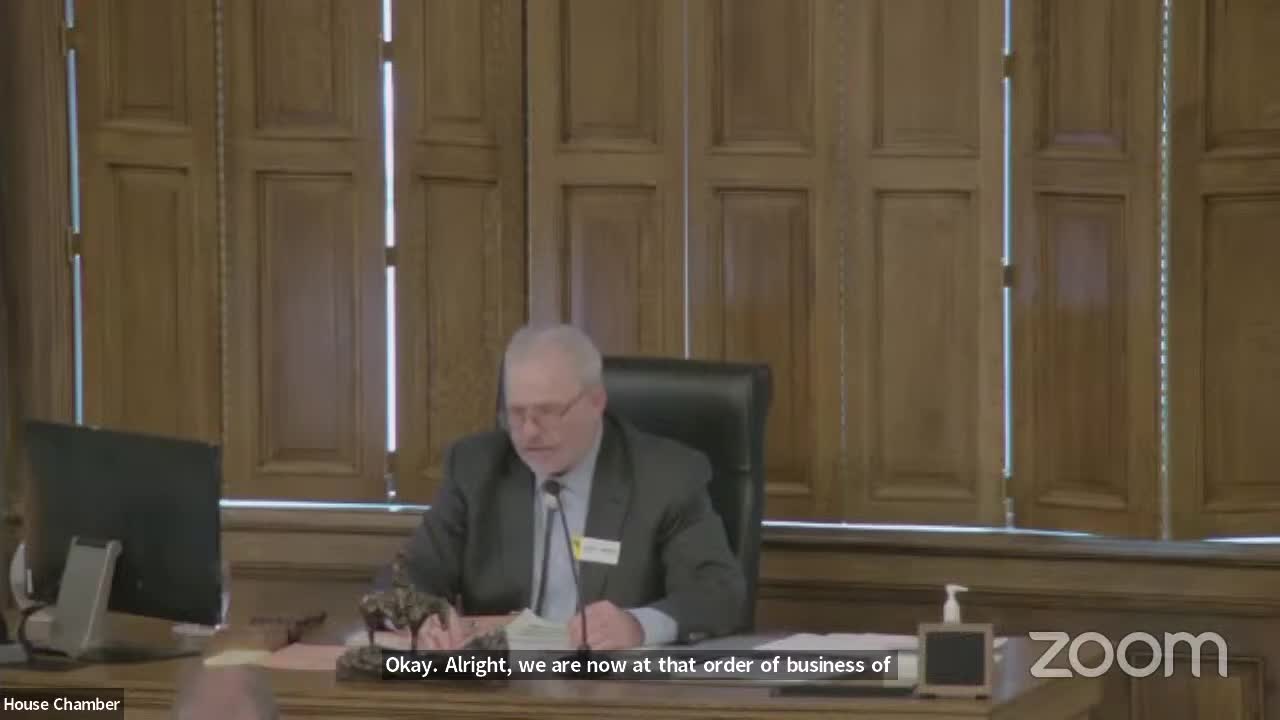House approves bill setting protections tied to potential bighorn sheep relocation amid landowner concerns
Get AI-powered insights, summaries, and transcripts
Subscribe
Summary
After amendments and extensive floor debate, the Wyoming House passed Senate File 118, which sets conditions, reimbursements and legal options should federal actions lead to domestic or bighorn sheep relocation in a defined area; debate centered on grazing rights, disease risk and federal management plans.
The Wyoming House passed Senate File 118, a measure establishing protections and response authorities related to potential bighorn sheep relocation in a specified cooperative review area, after several amendment votes and extended floor debate about grazing rights and federal land‑use plans.
Representative Pendergraft moved third‑reading amendment No. 2, which sought to delete a prior delay and move the process forward. He framed the bill as the result of decades of effort and said the area of concern had been narrowed to affect fewer landowners. ``This has been going on for over 20 years in trying to move this process forward,'' Representative Pendergraft said, urging members to move the process ahead.
Opponents emphasized landowner trust and the need for written assurances from federal agencies that grazing permits and resource management plans (RMPs) would not be altered adversely. Representative Otman, who described the animals as ``delicate,'' cautioned that immediate removal would be logistically harmful to bighorn sheep and emphasized that many landowners did not support reintroduction without firm written protections. Representative Otman also outlined the bill’s stated purposes on the floor: relocation or removal of bighorn sheep from the Sweetwater Rocks cooperative review area in response to specified federal action, reimbursement of relocation costs, authorization for the attorney general to act in certain circumstances, and amendments to the Wildlife‑Livestock Research Partnership Board duties.
Representative Conrad moved third‑reading amendment No. 3 to clarify the timing language that ties state enactment to federal action; Conrad summarized the amendment as specifying that ``if the federal government doesn't do anything by 07/01/2026, we enact this bill.'' He characterized that clarification as responding directly to landowner calls for certainty.
The floor rejected third‑reading amendment No. 2 (vote recorded as failed 26–31 after division) but later adopted amendment No. 3; third‑reading amendment No. 1 was withdrawn. Proponents argued the bill does not itself order reintroduction; rather, it would create statutory protections and state remedies if reintroduction occurs in the future. Representative Larson Lloyd said the legislation provides ``belts and suspenders'' to protect domestic livestock interests and to collect data to inform whether transplantation is appropriate.
Supporters framed the measure as a way to assert state authority and protect grazing allotments against potential federal actions; opponents warned that without explicit, written federal assurances about grazing permits and resource management plan non‑interference, affected leaseholders could face uncertain outcomes. Representative Pendergraft said the bill offers the state leverage to defend ranching uses of public lands and to remove animals if federal actions threaten grazing usage.
On final passage the clerk recorded 52 ayes and 10 noes; Senate File 118 has passed the House.
Votes and formal actions recorded on the floor:
- Third‑reading amendment No. 2 to Senate File 118 — mover: Representative Pendergraft — outcome: failed; recorded tally 26 yes, 31 no (division called).
- Third‑reading amendment No. 3 to Senate File 118 — mover: Representative Conrad — outcome: adopted (clarifies enactment trigger tied to 07/01/2026 in event of inaction by federal government).
- Third‑reading amendment No. 1 to Senate File 118 — outcome: withdrawn.
- Final passage vote on Senate File 118 — outcome: passed; roll call recorded 52 yes, 10 no.
Speakers representing a range of views included Representative Pendergraft (mover of amendment No. 2), Representative Western, Representative Penn, Representative Conrad (mover of amendment No. 3), Representative Otman (mover then withdrawer of amendment No. 1), Representative Larson Lloyd and several others. The bill directs state agencies to prepare reimbursement and response procedures and contemplates potential attorney general action if federal measures affect grazing allotments.
Why it matters: The measure creates statutory protections that would come into effect only if bighorn sheep were ever reintroduced in the specified area, and it reflects a long‑running state‑federal tension over grazing management, infectious disease risk between domestic and wild sheep, and landowner reliance on AUMs (animal unit months).
